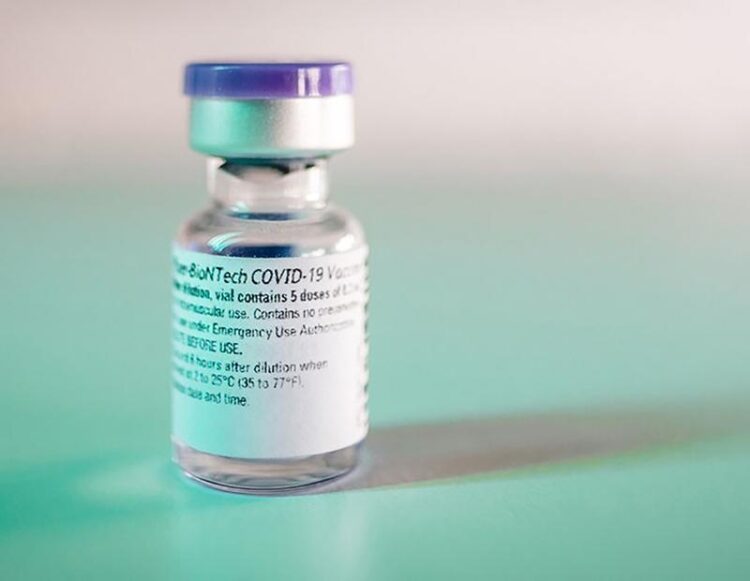Algorithms for manufacturing mRNA-based pharmaceuticals

BioNTech COVID-19 vaccine vial
© BioNTech SE
Software-optimized production processes for BioNTech
In just a few short years, BioNTech has grown from a small pharmaceutical company to an internationally active business with a global production network as well as value creation and supply chains that extend across the world. The company, which started out by developing individualized mRNA-based cancer drugs, managed to develop a vaccine against COVID-19 in record time. Manufacturing individualized medicines and producing hundreds of millions of vaccine doses requires detailed planning, coordination and management of the production processes involved. Working in collaboration with BioNTech, Fraunhofer ITWM in Kaiserslautern developed two software platforms that make it possible to implement planning and management processes for both cancer treatment and vaccination applications, and to adapt them to new requirements. “This isn’t possible with commercially available software, it calls for a solution that uses flexible mathematical methods and models – a tailor-made solution that is not only specifically designed for the processes at BioNTech, but can also optimize them. In the long term, the software platforms will also help to more clearly distinguish the products according to the different regulatory requirements of the approval authorities, as well as supporting the automation of the processes.” So says Dr. Heiner Ackermann, a researcher at Fraunhofer ITWM and the High Performance Center Simulation and Software Based Innovation in Kaiserslautern. At the beginning of the partnership with BioNTech, the processes underwent detailed analysis, modeling, and structuring, based on information supplied by the pharmaceutical company. “First of all, we had to apply a structure to BioNTech’s specific requirements and translate this into the language of mathematics,” explains Dr. Ackermann, who has been the project manager responsible for developing and optimizing the software platforms since December 2016.
Complex pharmaceutical processes, diverse challenges
This was no easy task, especially given the diverse challenges associated with such complex pharmaceutical processes as producing individualized cancer drugs. These challenges can stem from the particular difficulties posed by bioprocesses such as fluctuating process times and higher reject rates, for example, due to defective tissue samples. “Deviations and fluctuations in the process time crop up frequently in bioprocesses, but it is still necessary to maintain the utmost quality standards. The methods of producing individualized medicines are different from established processes in the pharmaceutical industry. Every step must be carried out extremely carefully and on an individual basis for each cancer patient, and the batches are also considerably smaller than in conventional processes. Ultimately, this makes the granularity of the mathematical model an important factor,” explains Dr. Ackermann.
Country-specific regulations
At the same time, in view of the extensive country-specific regulatory requirements for both cancer treatments and vaccine development, manufacturers need customized scheduling processes so that they can update their production plans in an optimal way. These schedules may provide important information such as the dates that each individual patient will receive their treatment.
BioNTech also relies on a network of external service providers to produce Comirnaty®. Each of these contract manufacturers specialize in certain process steps. To manage this network, it is necessary to make adjustments to account for the regulatory requirements of the various countries and the limited shelf life of the intermediate products. Furthermore, when developing vaccines, product variants must be considered during the production planning stage, for example, to account for the raw materials required, contractual partners, capacities and batches, production machines and locations.
Software with star quality
While these challenges present a considerable obstacle, the software platforms developed by Fraunhofer ITWM can tackle and ultimately overcome them. Now, at BioNTech, the softwares are central tools for planning, managing and documenting production. They also ensure long-lasting, stable production processes for the manufacturing of vaccines and individualized mRNA-based cancer treatments. “The solutions optimally support production planning and are used on a day-to-day basis,” says Dr. Ackermann. The platforms will be gradually expanded and adapted to developing requirements, as well as being integrated into BioNTech’s IT systems. “Thanks to our successful collaboration with the Fraunhofer ITWM team, BioNTech has acquired tailor-made solutions that provide vital support in high-stakes situations. We will continue to use the software-optimized processes in other areas in the future,” says Dr. Oliver Henning, Senior Vice President Operations at BioNTech.
Weitere Informationen:
https://www.fraunhofer.de/en/press/research-news/2022/september-2022/algorithms-…
Media Contact
All latest news from the category: Life Sciences and Chemistry
Articles and reports from the Life Sciences and chemistry area deal with applied and basic research into modern biology, chemistry and human medicine.
Valuable information can be found on a range of life sciences fields including bacteriology, biochemistry, bionics, bioinformatics, biophysics, biotechnology, genetics, geobotany, human biology, marine biology, microbiology, molecular biology, cellular biology, zoology, bioinorganic chemistry, microchemistry and environmental chemistry.
Newest articles

Combatting disruptive ‘noise’ in quantum communication
In a significant milestone for quantum communication technology, an experiment has demonstrated how networks can be leveraged to combat disruptive ‘noise’ in quantum communications. The international effort led by researchers…

Stretchable quantum dot display
Intrinsically stretchable quantum dot-based light-emitting diodes achieved record-breaking performance. A team of South Korean scientists led by Professor KIM Dae-Hyeong of the Center for Nanoparticle Research within the Institute for…

Internet can achieve quantum speed with light saved as sound
Researchers at the University of Copenhagen’s Niels Bohr Institute have developed a new way to create quantum memory: A small drum can store data sent with light in its sonic…





















